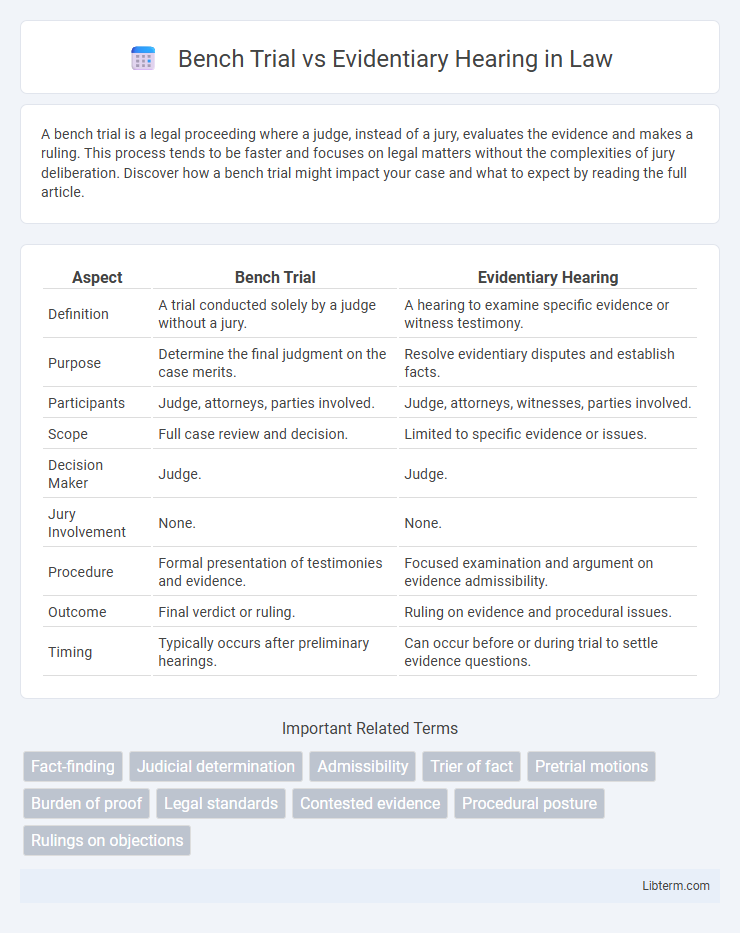A bench trial is a legal proceeding where a judge, instead of a jury, evaluates the evidence and makes a ruling. This process tends to be faster and focuses on legal matters without the complexities of jury deliberation. Discover how a bench trial might impact your case and what to expect by reading the full article.
Table of Comparison
| Aspect | Bench Trial | Evidentiary Hearing |
|---|---|---|
| Definition | A trial conducted solely by a judge without a jury. | A hearing to examine specific evidence or witness testimony. |
| Purpose | Determine the final judgment on the case merits. | Resolve evidentiary disputes and establish facts. |
| Participants | Judge, attorneys, parties involved. | Judge, attorneys, witnesses, parties involved. |
| Scope | Full case review and decision. | Limited to specific evidence or issues. |
| Decision Maker | Judge. | Judge. |
| Jury Involvement | None. | None. |
| Procedure | Formal presentation of testimonies and evidence. | Focused examination and argument on evidence admissibility. |
| Outcome | Final verdict or ruling. | Ruling on evidence and procedural issues. |
| Timing | Typically occurs after preliminary hearings. | Can occur before or during trial to settle evidence questions. |
Introduction to Bench Trials and Evidentiary Hearings
Bench trials involve a judge making findings of fact and law without a jury, often used when parties seek a faster or more technical resolution. Evidentiary hearings are limited court sessions aimed at deciding specific factual disputes or legal issues based on presented evidence before the main trial. Both procedures prioritize judicial efficiency by focusing on focused, factual determinations directly by the judge.
Definition of a Bench Trial
A bench trial is a legal proceeding where the judge serves as the fact-finder instead of a jury, evaluating the evidence and making rulings. This type of trial typically occurs in civil or criminal cases when both parties waive the right to a jury. Bench trials allow for a more streamlined process, often resulting in faster resolutions and focused judicial assessment of factual and legal issues.
Definition of an Evidentiary Hearing
An evidentiary hearing is a legal proceeding where parties present evidence and witness testimony to establish facts crucial for a court's decision, typically focused on specific issues rather than the entire case. Unlike a bench trial, which involves a judge making a final ruling on the merits of the case, an evidentiary hearing is limited in scope and often precedes further legal action. This hearing is essential for resolving disputes over evidence admissibility or factual determinations without a full trial process.
Key Differences Between Bench Trials and Evidentiary Hearings
Bench trials are formal judicial proceedings where a judge evaluates evidence and renders a verdict without a jury, typically used in criminal or civil cases. Evidentiary hearings specifically focus on the admissibility and relevance of evidence, often preceding the main trial to resolve disputes about what evidence will be presented. Key differences include the scope--bench trials determine case outcomes while evidentiary hearings address evidentiary issues--and procedural formality, with bench trials resembling full trials and evidentiary hearings serving a more limited, preparatory function.
Legal Purposes: When Each Process is Used
Bench trials are typically used when parties seek a judge-only decision on disputed facts or legal issues without a jury, often in civil cases or less complex criminal cases. Evidentiary hearings focus specifically on determining the admissibility of evidence or resolving preliminary factual disputes before the main trial. Courts use evidentiary hearings to assess the validity of evidence, while bench trials culminate in a final judgment based on both facts and law.
Procedural Steps in a Bench Trial
In a bench trial, procedural steps begin with opening statements, where attorneys outline their case to the judge without a jury present. This is followed by the presentation of evidence through witness testimonies, cross-examinations, and the submission of exhibits, allowing the judge to evaluate facts directly. The process concludes with closing arguments and the judge's decision, which is based on the evidence and legal standards without jury input.
Procedural Steps in an Evidentiary Hearing
Procedural steps in an evidentiary hearing include the presentation of evidence, examination and cross-examination of witnesses, and the submission of legal arguments. The hearing is conducted before a judge who evaluates the admissibility and credibility of evidence to make factual determinations. Unlike a bench trial, evidentiary hearings are narrower in scope and focus specifically on resolving disputed factual issues relevant to pretrial motions or specific legal questions.
Pros and Cons of Bench Trials
Bench trials offer a faster resolution since a judge solely evaluates the evidence without a jury, which can reduce procedural complexity and costs. However, bench trials may limit perspectives as the outcome depends entirely on a single judge's interpretation, potentially increasing unpredictability compared to jury trials. The absence of a jury also means there is less opportunity for community input, which can be crucial in cases requiring broader societal judgment.
Pros and Cons of Evidentiary Hearings
Evidentiary hearings allow for the presentation and evaluation of evidence before a judge, ensuring a thorough examination of factual disputes, which can lead to more informed decisions. However, these hearings can be time-consuming and costly due to the detailed process of witness testimonies and evidence admission. The focused nature of evidentiary hearings often promotes a clearer record for appeals but may delay resolution compared to bench trials.
Choosing Between a Bench Trial and an Evidentiary Hearing
Choosing between a bench trial and an evidentiary hearing depends on the complexity of legal issues and evidence involved. Bench trials involve a judge deciding both facts and law, suitable for cases requiring a full adjudication and testimony, while evidentiary hearings focus on limited issues such as admissibility of evidence or preliminary motions. Evaluating the scope of the dispute, procedural rules, and desired outcomes is critical for selecting the appropriate forum.
Bench Trial Infographic

 libterm.com
libterm.com